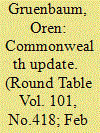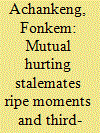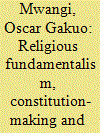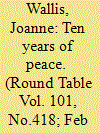| Srl | Item |
| 1 |
ID:
111173


|
|
|
|
|
| Publication |
2012.
|
| Summary/Abstract |
Militant Islamists terrorised Nigeria, killing hundreds in indiscriminate attacks. The Bangladesh army said it had foiled a coup attempt, while in Pakistan the army seemed closer to launching a coup itself. New Zealand's leader won a second term, Jamaica and Guyana elected new ones, but rival prime ministers vied for power in Papua New Guinea. Fiji lifted martial law. South Africa saw a global deal to combat climate change agreed in Durban but the government was criticised for resurrecting apartheid-era controls over the media. A Malaysian judge threw out a sodomy case against the opposition leader Anwar Ibrahim that was widely seen as politically motivated, and the Federated Farmers of New Zealand called for sheep shearing to become an Olympic sport.
|
|
|
|
|
|
|
|
|
|
|
|
|
|
|
|
| 2 |
ID:
111178


|
|
|
| 3 |
ID:
111177


|
|
|
|
|
| Publication |
2012.
|
| Summary/Abstract |
This paper explores ex-British Southern Cameroons' restoration of independence and statehood conflict with the Republic of Cameroon from the perspective of Zartman's 'mutual hurting stalemates' and 'ripe moments' framework in the timing of peace initiatives by third-party interveners. In analysing the conflict, the argument in the article is that powerful third parties need to use their power to intervene in deep-rooted conflicts whether or not they are violent, because violent or not, such conflicts remain destructive. The article traces the conflict from the independence-by-joining concept of the United Nations against the background of the incompatibility theory of plural societies. It provides an exploration of the dynamics involved in Zartman's framework, including its criticisms. The discussion of the implications of the concept highlights the vested interests of international mediating powers in play in international mediations, especially in post-colonial settings involving power imbalance between the conflict parties. In situations such as the Southern Cameroons' restoration of independence and statehood conflict with no open war and thousands of casualties, refugee flows and visible material destruction, the article questions whether the 'mutual hurting stalemates' and 'ripe moment' concept may not be a rationalisation for inaction.
|
|
|
|
|
|
|
|
|
|
|
|
|
|
|
|
| 4 |
ID:
111176


|
|
|
|
|
| Publication |
2012.
|
| Summary/Abstract |
This article examines religious fundamentalism, constitution-making and democracy in Kenya with regard to the arguments surrounding the inclusion of the Kadhis Courts in the country's new Constitution promulgated on 27 August 2010. Kadhis Courts deal with matters of Muslim law and have been entrenched in Kenya's Constitution since the country's independence in 1963. The article argues that the Church and clergy took a fundamentalist position regarding the inclusion of the Courts with the aim of influencing the country's predominantly Christian voters to reject the proposed new constitution at the referendum stage. Kenyans, however, the majority of whom are Christians, overwhelmingly endorsed the constitution. The article underscores that the Church, therefore, lost its moral responsibility and institutional legitimacy as an agent of democracy. The Kenyan experience indicates citizens can ignore religious fundamentalism for the common good of society.
|
|
|
|
|
|
|
|
|
|
|
|
|
|
|
|
| 5 |
ID:
111174


|
|
|
| 6 |
ID:
111175


|
|
|
|
|
| Publication |
2012.
|
| Summary/Abstract |
Between 1989 and 1997 Bougainville endured a complex secessionist war and localised conflict in which it is estimated that as much as 10% of its population died and up to 40% were internally displaced. In light of the extreme scale of the destruction wrought by the war, it is somewhat surprising how successful the peace process has been. In 2001 a comprehensive political settlement, outlined in the Bougainville Peace Agreement, granted Bougainville extensive political autonomy and guaranteed that a referendum would be held on its political future 10-15 years after an autonomous government was formed. By 2005 Bougainvilleans had worked together to conduct a weapons disposal process, draft a constitution and establish the Autonomous Bougainville Government (ABG). This article considers the progress that Bougainville has made implementing autonomy by evaluating the performance of the ABG. It concludes by foreshadowing Bougainville's future prospects, including the role that autonomy and the deferred referendum have played in settling the self-determination dispute.
|
|
|
|
|
|
|
|
|
|
|
|
|
|
|
|